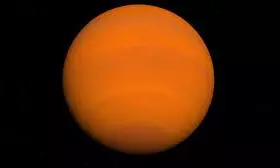
Scientists puzzled by planet as fluffy as cotton candy
text_fieldsAstronomers have made a perplexing discovery in the vast expanse of the universe: a planet larger than Jupiter but as light and fluffy as cotton candy.
Named WASP-193b, this bizarre exoplanet has been identified as the second least dense planet ever observed, according to findings published in the journal Nature Astronomy.
With a density of approximately 0.059 grams per cubic centimeter, or 3.68 pounds per cubic foot, WASP-193b is seven times less dense than Jupiter and slightly less dense than Earth.
"The planet is so light that it's difficult to think of an analogous, solid-state material. The reason why it's close to cotton candy is because both are pretty much air. The planet is basically super fluffy," explained study co-author Julien de Wit, a professor at the Massachusetts Institute of Technology.
The researchers also determined that WASP-193b orbits its star, which is similar in size to our Sun, every 6.2 days, at a distance approximately seven percent that of the Earth-Sun distance.
"WASP-193b is the second-least dense planet discovered to date, after Kepler-51d, which is much smaller," said study co-author Khalid Barkaoui, an exoplanet researcher at the University of Liege's EXOTIC Laboratory in Belgium.
"Its extremely low density makes it a real anomaly among the more than 5,000 exoplanets discovered to date. This extremely-low-density cannot be reproduced by standard models of irradiated gas giants, even under the unrealistic assumption of a coreless structure," Barkaoui added.
The age of WASP-193b is estimated to be up to six billion years old, presenting a cosmic mystery that requires further observational and theoretical investigation, according to Barkaoui.
To delve deeper into the characteristics of WASP-193b, scientists plan to utilize the James Webb Space Telescope, the most powerful telescope ever built by humans.






















